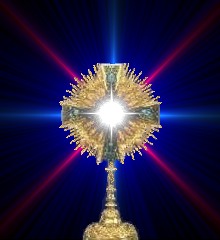The Eucharist—A Priceless
Treasure
To continue our discussion on Eucharistic Adoration, let’s consider
what Pope St. John Paul II had to say about it in his encyclical, Ecclesia
de Eucharistia:
“It is pleasant to spend time with
him, to lie close to his breast like the Beloved Disciple (cf. Jn 13:25) and to
feel the infinite love present in his heart. If in our time Christians must be
distinguished above all by the “art of prayer”, how can we not feel a renewed
need to spend time in spiritual converse, in silent adoration, in heartfelt
love before Christ present in the Most Holy Sacrament? How often, dear brother
and sisters, have I experienced this, and drawn from it strength, consolation
and support!
This practice, repeatedly praised
and recommended by the Magisterium, is supported by the example of many saints.
Particularly outstanding in this regard was Saint Alphonsus Liguori, who wrote:
“Of all devotions, that of adoring Jesus in the Blessed Sacrament is the
greatest after the sacraments, the one dearest to God and the one most helpful
to us”. The Eucharist is a priceless treasure: by not only celebrating it but
also by praying before it outside of Mass we are enabled to make contact with
the very wellspring of grace.”
Perpetual Adoration
During the parish mission conducted recently at St. Francis
of Assisi in Castle Rock, signup sheets were available for people to volunteer
to spend time in front of the Blessed Sacrament—face time with Jesus. This is part of the ongoing efforts to
generate a practice of “perpetual adoration.”
The goal of perpetual adoration is to have one or more people committed
to one of the 168 hours a week to sit in the Real Presence and pray to
Jesus. To some that may sound like a
hard commitment to make, but to reiterate a point from the last post on this
topic, it’s only one hour a week. Giving
God an hour of our time seems like a pretty uneven swap when we think about
what He’s done for each of us and His particular love for each and every one of
us.
Lectio Divina
Starting with the first week of Advent for the 2015-2016
liturgical year, the USCCB has a downloadable guide for lectio divina (Latin
for “divine reading”) prayer each week.
This is a great starting point for anyone who might want to expand their
approach to prayer while in Eucharistic Adoration (or at any other time as
well). In his book, Praying Constantly: Bringing Your
Faith to Life, the late Fr. Benedict Groeschel, C.F,R., provides a nice
summary of lectio divina at pp. 94 - 97:
- Calm ourselves—become silent and receptive to whatever God has to say
- Begin to read a passage slowly—as slowly as possible, dwelling on words and phrases—NOT analyzing or interpreting, but remaining open to let God speak to us. We don’t need to read too much
- Pause when something speaks to us in a special way—stop to ponder it—this is the meditation part of divine reading
- Repeat this over and over for the passage through which God seems to be speaking clearly to us
- Slowly we move from reading—to meditation—and to prayer
- In the prayer part, we let God take the lead and we listen to Him, letting Him guide us in a gentle dialogue
- Contemplation is the final stage, which involves letting go of words and thoughts, and comes from the grace of God, not from our efforts and happens according to His schedule, not ours.
Father Benedict closes by telling us, “The point of lectio
divina is simple. It is merely to be
with God in a stillness interrupted by nothing more than the holy words of
Scripture. It is to let God remove the
barriers between Himself and us, one by one, until we are as open as we
possibly can be to the movement of God’s Holy Spirit…the rewards can be
enormous.”
For more information on how to use lectio divina, take a
look at Dan Burke’s post at Catholic Spiritual Direction.
There Are Other Ways
as Well
If we don’t feel like doing divine reading, we can just go
to visit Jesus and talk with Him. We can
let Him know what’s on our mind, and share with Him what we’re grateful for. We can let Him know what’s troubling us and
let Him help us:
Jesus said to the crowds: “Come to
me, all you who labor and are burdened, and I will give you rest. Take my
yoke upon you and learn from me, for I am meek and humble of heart; and
you will find rest for yourselves. For my yoke is easy, and my burden
light.” – Mt. 11: 28-30
At the end of the day, it’s not so much how we pray but that we actually visit Jesus in the Blessed
Sacrament routinely. He’s waiting, and He
wants desperately to see each one of us there.
Let us not disappoint Him.
http://www.vatican.va/holy_father/special_features/encyclicals/documents/hf_jp-ii_enc_20030417_ecclesia_eucharistia_en.html
http://usccb.us8.list-manage2.com/track/click?u=b927174dbe854683d4b527f98&id=3b6566ebff&e=b6cb03a4e7
http://www.spiritualdirection.com/2012/04/21/what-is-lectio-divina-and-will-it-help-my-prayer-life-a-guide-to-lectio-divina
